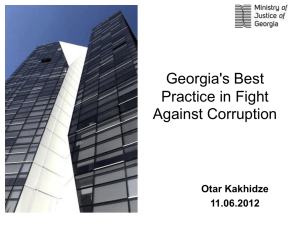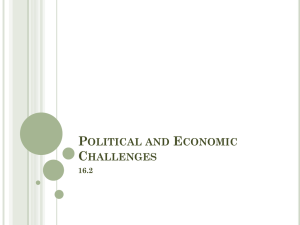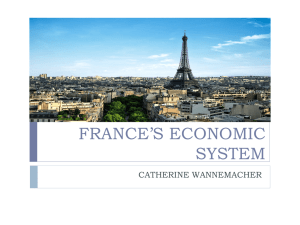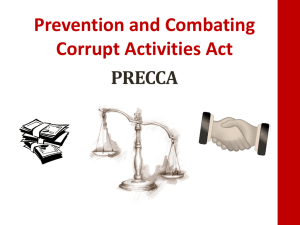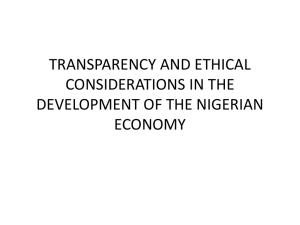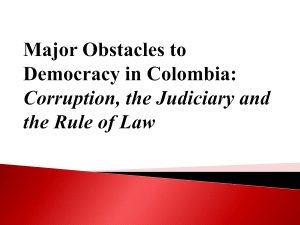Powerpoint
advertisement
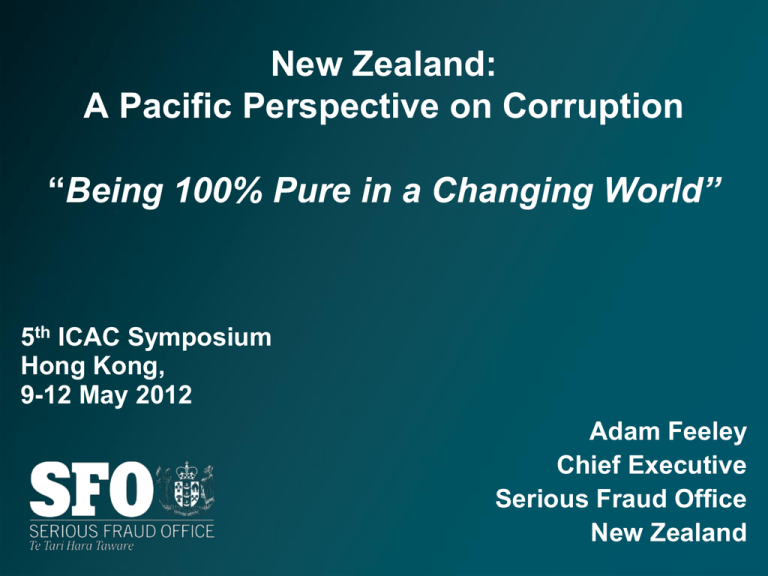
New Zealand: A Pacific Perspective on Corruption “Being 100% Pure in a Changing World” 5th ICAC Symposium Hong Kong, 9-12 May 2012 Adam Feeley Chief Executive Serious Fraud Office New Zealand 100% Pure? PM dismisses worries of taint to 'Pure' brand 2 100% Pure? The Role of SFO The Role of SFO Small law enforcement agency of fraud investigators, forensic accountants and lawyers, with external Prosecuting Panel of QCs and Crown Solicitors. Serious Fraud Office Act: “to detect, investigate and prosecute cases of serious or complex fraud.” Memorandum of Understanding with NZ Police: to be the lead referral agency for all complaints of corruption in New Zealand. 5 The Role of SFO 6 SF New Zealand’s place in the World TI Corruption Perception Index: 1995-2011 NZ ranked 1st for 8 of 17 years, and Denmark 1st for 6 of 17 years Country Average ranking Average score Denmark 2.0 9.53 New Zealand 2.0 9.46 Finland 2.3 9.48 Sweden 4.2 9.24 Singapore 5.0 9.19 Iceland 5.4 9.16 Australia 9.5 8.69 UK 12.9 8.35 Ireland 16.2 7.72 Samoa 62.2 4.23 Tonga 108.2 2.88 8 Factors in being ‘corruption-free’ Human development & national culture* 1. Increased human development (HD) = lower corruption 2. National cultures that strengthen the link between human development and low corruption: • Citizens disinclination to accept power imbalances in society • High levels of individualism • A society built on traits of achievement; advancement; and material wealth • The ability to influence the decisions of others in power. * A Contingency Theory of Corruption – Sims, Gong & Ruppel 10 NZ: The Good; The Bad; and The Ugly New Zealand: The Good Democratic Institutions: NZ Denmark High voter participation 5th 9th Free press 8th 1st Apolitical public service Independent judiciary and Govt. ‘watchdogs’ Independent law enforcement agencies Wide-ranging civil/human rights legislation Freedom of information legislation 12 New Zealand: The Good Social factors: NZ Denmark High life expectancy 15th 43rd High literacy 10th 10th High education enrolment 2nd 4th High ‘life satisfaction’ 11th 1st High human development 3rd 14th High gender equality 6th 7th International reputation for being ‘clean and green’ 13 New Zealand: The Good Economic Standards: NZ Denmark High minimum wages 2nd n/a Govt. global competitiveness 5th 11th Economic freedom 4th 11th Strength of business environment 8th 6th Low poverty levels 21st 5th GDP/head 38th 8th 14 New Zealand: The Bad • • • NZ has not ratified UNCAC Relevant legislation is from 1910 and 1961 No prosecutions for foreign corrupt practice TINZ 2010 Global Corruption Barometer: • 4% of NZ’ers admit paying a bribe to win business (c.f. 0% Denmark; 1% UK; 2% Australia) • 73% NZ’ers believe corruption is increasing • Only 44% of NZX top 50 companies have anti-bribery policies (c.f. 72% UK; 69% USA; 50% Europe) 15 New Zealand: The Bad TVNZ website poll 2011 “Is NZ the least corrupt country in the world?” 47% “Yes, we’re squeaky clean” 57% “No, we’re deluding ourselves” Auditor-General Public Sector Fraud Survey 2010 •22.5% have seen internal fraud in the past year •Only 39% of known frauds are reported to enforcement authorities •Only 23% receive fraud awareness training 16 New Zealand: The Ugly Public corruption recent years •R v Field: Cabinet Minister convicted of accepting bribes perverting the course of justice •R v Awatere Huata: MP convicted of fraud and perverting the course of justice •R v Chapman: Auditor-General convicted of workplace theft •R v Nua: Senior Customs official convicted of receiving bribes 17 New Zealand: The Ugly Public corruption recent years •R v Palmer: Official within GSF convicted of insider trading on confidential government information •R v Mason: Government property manager convicted of receiving bribes/hospitality for approving leasing contracts •R v Griffiths: Government property manager convicted of receiving bribes to secure leases 18 The Changing Face of NZ Society The Changing Face of New Zealand Ethnic diversity Different values, different practices: R v Field – Thai and Samoan “cultural expression of gratitude” included gifts and payments 20 The Changing Face of New Zealand Growing gap between rich and poor 21 The Changing Face of New Zealand • Increasing influence of transnational organised crime: Vicam (Auckland) Ltd; SP trading Ltd – NZ ‘shelf’ companies aiding international criminal networks • Increasing dependence of NZ companies on international trade: “Kiwi Firms Must Work Around Corruption” – Prime Minister John Key • Growing international links: Oceania ‘vote selling’ for FIFA 2018 22 The Changing Face of New Zealand ‘Corruption’ a more frequent media issue 2008 election: Political party donations: ‘Glenngate’ 3000 2005 election: Exclusive Brethren & Labour's pledgecard 2500 2007: Electoral Finance Act 1999: Labour campaign on Govt. sleaze 2000 1500 1000 2010: Minister credit card scandal 1996: First MMP Election 2009: MP expenses debate; Early 1990s: Diversification of political parties in NZ Ex-MP Phillips Field convicted of corruption 500 23 0 1990 1991 1992 1993 1994 1995 1996 1997 1998 1999 2000 2001 2002 2003 2004 2005 2006 2007 2008 2009 2010 Staying ‘Pure’ What Can Be Done – Domestically • • • • • • Promote much more discussion about corruption Education for NZ companies at risk of FCP laws; e.g. UK Bribery Act Work to ratify UNCAC Work to modernise bribery/corruption legislation Work with TI, IBE etc. to promote public expectations around ethical corporate behaviour Acknowledge the economic link between the “100% Pure” & “Clean and Green” brands and the international reputation for being corruption-free There is no basis for complacency! 25 What Can Be Done - Internationally 1. 2. • • An international crime needs international solutions The law enforcement solutions are multi-layered Prevention: Education Detection: Intelligence sharing: International agreements: s.51 SFO Act: “The Director may enter into any agreement or agreements with any person in any other country whose functions include investigation or prosecution of fraud” • • • Investigation: Joint operations: s.36 SFO Act Prosecution: Common objectives; effective outcomes - ICAC/NZ SFO Reform: Alternative powers and sanctions 26 Conclusion Corruption in Society History is no guarantee to future corruption trends Corruption is a growing threat to previously ‘pure’ countries because: •Crime is increasingly trans-national •Rising social inequality in a post-GFC era •Societies are increasingly diverse and fragmented with differing and values Every country will have (or need to find) their own unique motivators for deterring corruption. •The “100% Pure” reputation resonates emotionally with Kiwis, but also has important economic value 28 Corruption & Law Enforcement Cooperation and Coordination •The good must associate, but the talented must also teach •Operational pragmatism not legal bureaucracy •Forum for building operational links •Nothing succeeds like success…and trusted relationships •“100% Pure” is an admirable goal for us all 29 THANK YOU. QUESTIONS? WWW.SFO.GOVT.NZ

